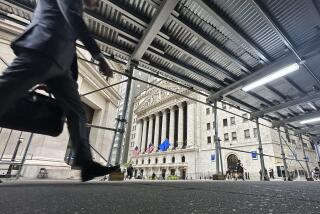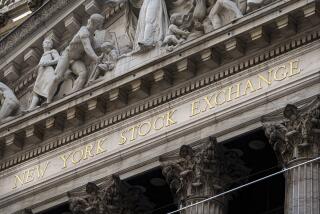Markets likely to stay jumpy as investors fret over end of easy money
- Share via
NEW YORK -- Jumpy markets may not calm down anytime soon.
Stocks have become increasingly volatile in recent weeks, moving sharply higher or lower -- and then abruptly reversing -- at the slightest hint a central bank may tighten the spigot of easy money into the world’s economies.
The Dow Jones industrial average was down more than 100 points in early trading Tuesday, following a global stock slump on worries the Japanese central bank would ease off its stimulus plan. Major U.S. indexes pared their losses midway through the trading day.
The anxiety is spilling over from bond markets, as investors are trying to position themselves in case the Federal Reserve signals when it may begin to slow down its unprecedented stimulus.
“This could be another rocky summer,” said Brian Brennan, a bond portfolio manager at T. Rowe Price.
Investors are preparing for the Fed to telegraph when it may slow down its stimulus program, known as quantitative easing. They are also watching for signs the U.S. labor market is improving or inflation is picking up -- key metrics Fed officials are also watching.
QUIZ: How much do you know about the stock market?
“It’s been painfully volatile” in the bond market, said Christine Hurtsellers, chief investment officer for fixed income at ING U.S. Investment Management. “The market has just gotten ahead of the Fed.”
The benchmark 10-year Treasury bond yield spiked nearly 0.5 percentage point in May to its highest level in more than a year. On Tuesday the 10-year government bond’s yield continued to rise, and was inching above 2.2%.
Bond prices move inversely to yield, so the spike in Treasury yields has come with a sharp fall in prices -- a decline of more than 5% this year. (By contrast, stocks are up about 15% this year.)
The Fed’s $85-billion-a-month bond purchases have pushed down interest rates and made borrowing cheaper and easier. They have also made stocks and other riskier investments more attractive.
ALSO:
Dole CEO Murdock makes $1.1-billion takeover bid
Financial woes have fallen to lowest level in 4 years, report says
Conservative economists back Jason Furman for key White House post
More to Read
Inside the business of entertainment
The Wide Shot brings you news, analysis and insights on everything from streaming wars to production — and what it all means for the future.
You may occasionally receive promotional content from the Los Angeles Times.










